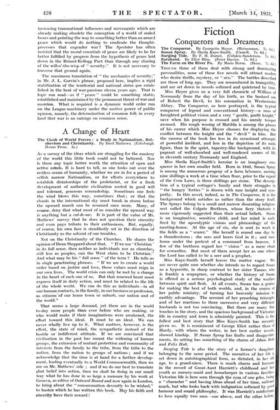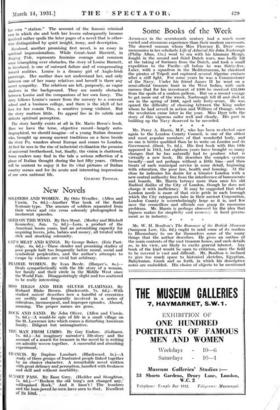F' •
action
Conquerors and Dreamers
The Farm on the River Po. By Mario Boma. (Berm. 78. ed,) THOUGH three of them deal with strong and dominating personalities, none of these five novels will attract readers who desire thrills, mystery, or " sex." The battles described are those of long ago. They are remembered in tranquillity, and are set down in moods softened and quietened by time.
Miss Heyer gives us a very full chronicle of William of Normandy from the day of his birth, as the bastard son of Robert the Devil, to his coronation in Westminster Abbey. The Conqueror, as here portraYed, is the typical conqueror of legend and conventional history—a man of farsighted political vision and a very " gentle, parfit knight," save when his purpose is crossed and his unruly temper aroused. His rough wooing of Matilda is among the phases of his career which Miss Heyer chooses for displaying the conflict between the knight and the " devil " in him. But the success of the book lies less in its occasional attempts at powerful incident, and less in the depiction of its main figure, than in the quiet, tapestry-like background, with its pageant of well-absorbed and well-rendered scenes of life in eleventh century Normandy and England.
Miss Sheila Kaye-Smith's heroine is an imaginary con- queror in her own smaller field. Born in 1842, Susan Spray is among the numerous progeny of a farm labourer, earning nine shillings a week at a time when flour, prior to the repeal of the Corn Laws, is three shillings per stone. The descrip- tion of a typical cottager's family and their struggles in " the hungry 'forties " is drawn with rare insight and sym- pathy. In this novel, indeed, as in The Conqueror, it is the background which satisfies us rather than the story itself. The Sprays belong to a small and narrow dissenting religious sect called the Colgate Brethren, whose fiery -rhetoric is more vigorously suggested than their actual beliefs. Susan is an imaginative, sensitive child, and her mind is early fired by the apocalyptic visions and . phra-seology of the meeting-house. At the age of six, she is sent to work in the fields as a " scarer." She herself is scared one day by a thunderstorm ; she sees and hears God in it ; and runs home under the pretext of a command from heaven. A few of the brethren regard her " vision " as a mere cloak for cowardice. But most of them accept her as one whom the Lord has called to be a seer and a prophet. • • Miss Kaye-Smith herself leaVes the matter vague. We are never quite sure whether she intends us to regard Susan as a hypocrite, in sharp contrast to her sister Tamar, who is frankly a scapegrace, or whether the history of Susan is offered as a serious psychological study of the warfare between spirit and flesh. At all events, Susan has a genius for making the best of both worlds, and, in the course of
her public ministry, of turning her heavenly mission to earthly advantage. The account of her preaching triumphs and of her reactions to three successive and very different
husbands is not too convincing. But there are many fine touches in the story, and the spacious background of Victorian life in country and town is admirably painted. This is the fullest and best story that Miss Kaye-Smith has recently given us. It is reminiscent 'of George Eliot rather than of Hardy, with whom the writer, in her best earlier novels, showed kinship.. If Susan, Spray has faults and disappoint- ments, its setting has something of the charm of Adam Bedt and Felix Holt.
Surging Tide is also the story of a farmer's daughter, belonging to the same period. The narrative of . her life is
set down in autobiographical form, as dictated, in her old age, to a grand-niece. There is much charm and humour in the record of Great-Aunt Harriett's childhood and her youth as nursery-maid and housekeeper in various families
Victorian life is here seen through the eyes. of one rho, being a " character " and having ideas ahead of her time, suffered much, but who looks back, with indignation softened by good humour and sound philosophy, It was Harriett's Misfortune to love equally two men—one above, and the other below, her own " station." The account of the famous criminal case in which she and both her loveks subsequently became involved rather spoils the later pages of a novel that is other- wise distinguished by quiet insight, irony, and description.
Saraband, another. promising first novel, is an essay in spiritual impressionalism. While Great-Aunt Harriett, in Surging Tide, represents feminine courage and common sense triumphing over obstacles, the story of Louise Burnett, in Saraband, is one of outward failure and of compensating inward realities. Louise is a dreamy girl of Anglo-Irish parentage. Her mother does not understand her, and only between one of her many relatives and herself is there any secret sympathy. The relatives are left, purposely, as vague shadows in the background. They are merely obstacles between Louise and the companions of her own fancy. The story follows Louise's career from the nursery to a convent school and a business college, and there is the idyll of her love for her cousin Tim,, a sensitive young violinist. But the story matters little. Its appeal lies in its subtle and delicate spiritual perception.
The story hardly exists at all in Dr. Mario Borsa's book. Here we have the terse, objective record—largely auto- biographical, we should imagine—of a young Italian dreamer who, brought up among ancient traditions on a farm beside the river Po, wanders about Europe and comes to London. At first he sees in the rise of industrial civilization the promise of universal brotherhood, but, finally, the vision is shattered. Some readers may find in the tale a serious reflection of a phase of Italian thought during the last fifty years. Others will he content to enjoy it for its vital pictures of Italian country scenes and for its acute and interesting impressions of our own national life.
GILBERT THOMAS.
























































 Previous page
Previous page